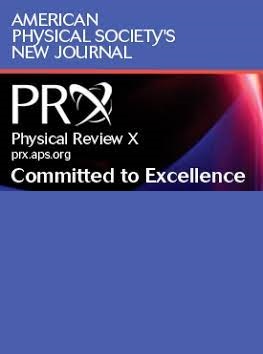耗散自旋玻色子模型的混合量子经典随机方法
IF 15.7
1区 物理与天体物理
Q1 PHYSICS, MULTIDISCIPLINARY
引用次数: 0
摘要
自旋-玻色子模型涉及许多相互作用的自旋和玻色子,在量子模拟平台中无处不在。与此同时,描述这些量子系统的动力学特征是一个重大挑战。这里,我们考虑一般的自旋玻色子模型,其中玻色子受马尔可夫耗散(例如,由于腔损失)的影响。我们提出了一种精确的量子-经典混合随机方法,将模拟玻色子模式的经典随机方程的解输入到自旋的量子随机方程中。此外,自旋对于每个随机实现都是有效解耦的,然而这是以非物理状态的采样为代价的。与现有的基于影响泛函形式的随机方法相比,我们对初始状态或自旋玻色子耦合(除了它在玻色子算子中是线性的)没有限制(可分解性或高斯性)。马尔可夫耗散是我们方法的核心,它使随机方程即使在强耦合状态下也是马尔可夫的。此外,它保证了每个实现的密度矩阵的厄米性(尽管不是正性),从而提高了随机抽样的收敛性。有趣的是,我们发现了在多体环境下单原子协同性的系统经典可模拟性的一个条件。我们在几个示例中对我们的方法进行了基准测试并展示了其实用性,特别是在直接数值计算不可行的情况下。2025年由美国物理学会出版本文章由计算机程序翻译,如有差异,请以英文原文为准。
Hybrid Quantum-Classical Stochastic Approach to Dissipative Spin-Boson Models
Spin-boson models involving many interacting spins and bosons are ubiquitous in quantum simulation platforms. At the same time, characterizing the dynamics of these quantum systems represents a significant challenge. Here, we consider general spin-boson models where bosons are subject to Markovian dissipation (e.g., due to cavity loss). We present an exact hybrid quantum-classical stochastic approach where the solution of a classical stochastic equation—mimicking the bosonic modes—is input into a quantum stochastic equation for the spins. Furthermore, the spins are effectively decoupled for each stochastic realization, which nevertheless comes at the expense of sampling over unphysical states. In contrast with existing stochastic approaches based on the influence functional formalism, we place no restriction (factorizability or Gaussianity) on the initial state, or the spin-boson coupling (except that it be linear in the bosonic operator). Markovian dissipation, being at the heart of our approach, renders the stochastic equations Markovian even in the strong coupling regime. Furthermore, it ensures hermiticity (though not positivity) of the density matrix for each realization, thus improving the convergence of stochastic sampling. Interestingly, we find a condition on the classical simulability of the system based solely on the single atom cooperativity even in a many-body setting. We benchmark and showcase the utility of our approach in several examples, specifically in cases where a direct numerical computation is unfeasible. Published by the American Physical Society 2025
求助全文
通过发布文献求助,成功后即可免费获取论文全文。
去求助
来源期刊

Physical Review X
PHYSICS, MULTIDISCIPLINARY-
CiteScore
24.60
自引率
1.60%
发文量
197
审稿时长
3 months
期刊介绍:
Physical Review X (PRX) stands as an exclusively online, fully open-access journal, emphasizing innovation, quality, and enduring impact in the scientific content it disseminates. Devoted to showcasing a curated selection of papers from pure, applied, and interdisciplinary physics, PRX aims to feature work with the potential to shape current and future research while leaving a lasting and profound impact in their respective fields. Encompassing the entire spectrum of physics subject areas, PRX places a special focus on groundbreaking interdisciplinary research with broad-reaching influence.
 求助内容:
求助内容: 应助结果提醒方式:
应助结果提醒方式:


